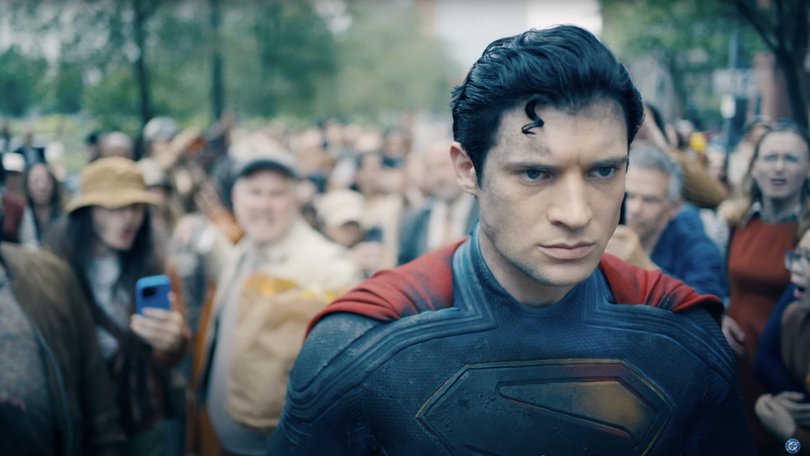THE WASHINGTON POST: Our MAGA-era Superman taking on his greatest foe ... Donald Trump

In the new Superman movie, our extraterrestrial hero confronts perhaps the most formidable foe of his lifetime: President Donald Trump.
One of the Colossus of Krypton’s greatest superpowers has always been the ability to adapt to the enemy du jour, and this film is no exception.
In “Superman,” the Man of Steel flies back to his New Deal progressive roots and strikes out at the commander in chief’s mean-spirited policies even as he never mentions the President by name.
Sign up to The Nightly's newsletters.
Get the first look at the digital newspaper, curated daily stories and breaking headlines delivered to your inbox.
By continuing you agree to our Terms and Privacy Policy.All the MAGA-era bad guys we know today are there in writer-director James Gunn’s cast.
There’s the scheming tech titan Lex Luthor, an easy stand-in for the world’s richest and least secure man, Elon Musk, and meta-megalomaniac Mark Zuckerberg. Then there’s Vasil Ghurkos, the president of Boravia, who is hell-bent on squashing his meek neighbour and is a doppelgänger for Vladimir Putin or perhaps Benjamin Netanyahu.
Meanwhile, Superman leaps into the role of all that Trump despises: a determined defender of the downtrodden without regard for borders or citizenship, a proud alien of the sort that Trump might call a “death wish for our country,” and a superhuman USAID.
Gunn hasn’t shied away from inviting political interpretations, even as he’s refrained from directly linking the film to the White House.
Ahead of its release, he reminded audiences in an interview that Superman is an “immigrant” who represents “the story of America” and he predicted that some “jerks will take it as offensive just because it is about kindness”.
Sure enough, plenty of Trump’s defenders are smashing back.
Fox News host Greg Gutfeld opined that Gunn was “creating a moat of woke,” as a televised graphic worried that the “Superwoke” movie embraced “pro-immigrant themes.” And former TV Superman Dean Cain asked, “How woke is Hollywood going to make this character? … How much is Disney going to change their Snow White? Why are they going to change these characters to exist for the times?”
But changing a hero’s character to “exist for the times” is a tradition as old and American as apple pie.
Since he was brought to life 87 years ago, Superman has evolved more than the fruit fly. In the 1930s, he was just the crime fighter we needed to take on mobsters and robber barons. In the 1940s, he defended the home front while brave GIs battled fascism overseas. Early in the Cold War, he stood up taller than ever for his adopted country, while in its waning days he tried single-handedly to eliminate nuclear stockpiles.
For each era, he zeroed in on the threats that scared us most, using powers that grew or diminished depending on the need. So did his spectacles, hair style, even his job title. Each generation got the Superman it needed and deserved, one who served as a beacon of hope against whatever in the evening news made us despair.
And it was not just Superman but everyone around him who was changing — in fact, this isn’t even the first time Trump’s impact was felt in Metropolis.
Al Capone had been the right role model for villains in the 1930s, Adolf Hitler for the 1940s, and a Dr Strangelove-like mad scientist in the 60s. In the 1980s, the bad guys were corporate raiders who wore Ralph Lauren suits and ID badges to the stock exchange. Lex Luthor, Metropolis’s wealthiest and slimiest citizen, increasingly resembled a certain braggadocious real estate magnate who had become ubiquitous in popular culture, with shades of Gordon Gekko thrown in.
The new Lois was even more a creature of her times. In the films of the 1970s and 80s, she was no longer the distressed damsel or columnist to the lovelorn we’d become accustomed to. Margot Kidder, the sassy role model for Gunn’s Lois, tells Christopher Reeve’s Clark Kent, “I’ve seen how the other half lives. My sister, for instance. Three kids, two cats and one mortgage. I would go bananas in a week.”
And in every iteration, from comics to television to film, Superman faced critics who were upset with his latest slant on truth, justice and the American way.
In the 1980s, with Ronald Reagan in the White House, Superman was reimagined as a more flag-waving hero — and “anal-retentive fanboys” vented their anger “even before the work saw print,” recalled John Byrne, who led that reboot.
Conservatives were likewise outraged each time Superman returned to his liberal roots. The biggest uproar over Superman’s politics and his impact on readers came in the 1950s, during the ascendancy of the Red-baiting Senator Joseph McCarthy, whose playbook Trump so often borrows.
It was called the Great Comic-Book Scare, and its best-known proponent was psychiatrist and author Fredric Wertham, who told members of Congress that Superman stories were “particularly injurious to the ethical development of children” and inspired “fantasies of sadistic joy” in children reading about their hero pummelling his foes.
Superman will surely go through many more iterations — and backlashes — as future generations try out new angles suited to their times.
Writer Ta-Nehisi Coates reportedly pitched Warner Brothers on a Black Superman battling Jim Crow, which was apparently a bit too far for the sales-sensitive studio.
But for now, what could be more USA than an orphaned outsider who arrives in this land of immigrants, reinvents himself and reminds us that we can reach for the sky?
(c) 2025, The Washington Post.
Originally published as Fear of a ‘woke’ Superman.
Larry Tye is author of “Superman: The High-Flying History of America’s Most Enduring Hero.”
